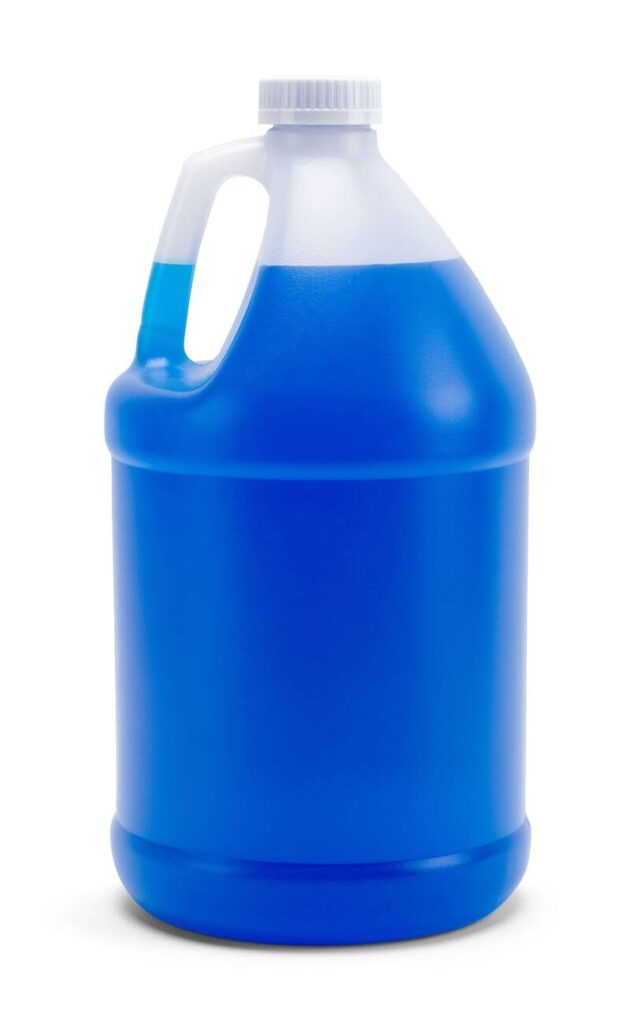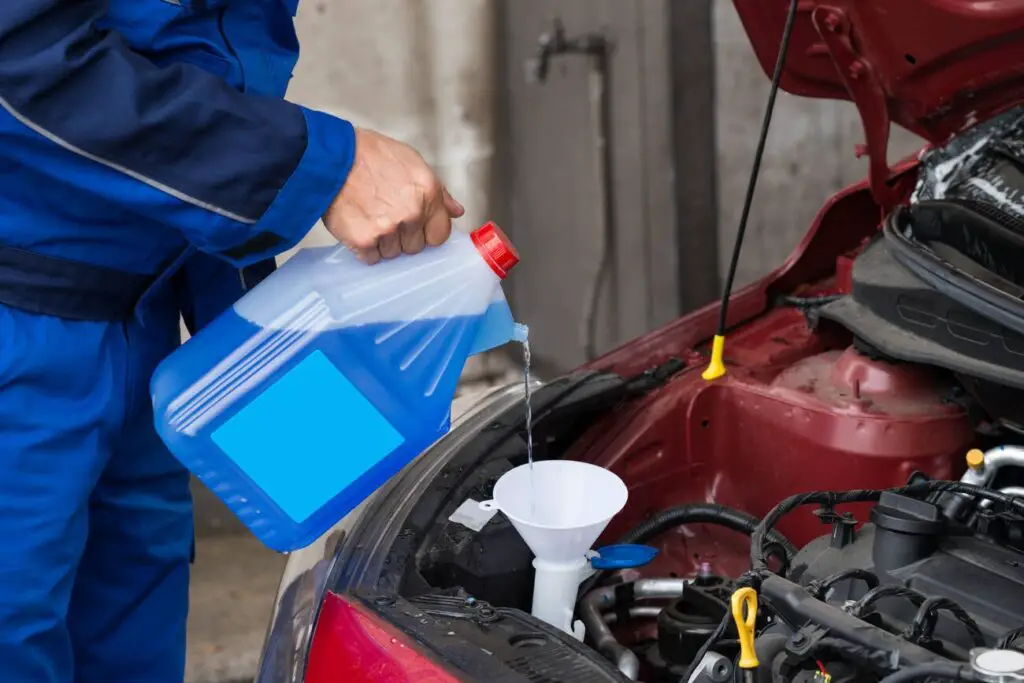Yes, windshield washer fluid can be flammable due to its methanol or ethanol content, which are both alcohol-based solvents. While it’s not highly flammable under normal conditions, it can ignite if exposed to an open flame or high heat.
Windshield washer fluid is a common automotive product designed to keep your windshield clear of dirt, grime, bugs, and other debris. While it plays a critical role in maintaining driver visibility, one question often arises: Is windshield washer fluid flammable? This is an important safety consideration, especially since many vehicle fluids-such as gasoline or engine oil-are highly flammable.
In this detailed blog post, we’ll explore the composition of windshield washer fluid, its potential fire risks, and how to safely store and use it. We will also cover five frequently asked questions to address common concerns.

Contents
- 1 What is Windshield Washer Fluid?
- 2 The Role of Methanol in Flammability
- 3 Is Windshield Washer Fluid Flammable?
- 4 How to Safely Handle and Store Windshield Washer Fluid
- 5 Alternatives to Traditional Windshield Washer Fluids
- 6 Health Hazards of Windshield Washer Fluid
- 7 Environmental Impact of Windshield Washer Fluid
- 8 Frequently Asked Questions
- 9 Conclusion
What is Windshield Washer Fluid?
Windshield washer fluid is a liquid solution used in vehicles to clean the windshield when sprayed through the washer nozzles. It is typically stored in a reservoir under the hood of the vehicle and is easily activated by the driver with the press of a button or lever. The fluid is designed to remove dirt, bird droppings, road grime, and insects, which can obscure visibility and cause driving hazards.
Composition of Windshield Washer Fluid
The primary components of most windshield washer fluids are water, methanol (a type of alcohol), and other chemicals like ethylene glycol, propylene glycol, or detergents. The exact formulation depends on the brand and whether the fluid is intended for use in freezing conditions or warmer climates. Below is a typical composition of windshield washer fluid:
- Water: The base of the solution, which makes up the majority of the fluid.
- Methanol: An alcohol-based solvent that lowers the freezing point and improves cleaning efficiency.
- Detergents: These help to break down dirt, grime, and oils on the windshield.
- Other Additives: Some formulations include ethylene glycol, propylene glycol, or isopropanol to prevent freezing, increase cleaning power, or enhance performance in extreme weather conditions.
The Role of Methanol in Flammability
Methanol is a significant component in many windshield washer fluids because it prevents the solution from freezing in cold weather. Methanol is also a powerful solvent that helps to clean effectively. However, it is important to understand that methanol is highly flammable.
- Flash Point of Methanol: Methanol has a flash point of about 11-12°C (52-54°F). This means that when methanol is exposed to an open flame or heat source at or above this temperature, it can ignite. The flash point is an important measure in determining whether a substance is flammable.
- Concentration of Methanol: Windshield washer fluid usually contains 20-40% methanol, with the remaining portion primarily water. This dilution reduces its overall flammability compared to pure methanol, but it still poses some risk.
Is Windshield Washer Fluid Flammable?
The answer depends on the composition and concentration of methanol or other alcohols present in the fluid. In general, yes, windshield washer fluid can be flammable, especially if it contains a high concentration of methanol or isopropanol. However, it is not as easily ignitable as pure methanol or other highly flammable liquids like gasoline.
How Flammable is Windshield Washer Fluid?
While windshield washer fluid can catch fire due to the presence of methanol, it typically requires exposure to an open flame or a very high heat source. Under normal conditions, windshield washer fluid is not considered a severe fire hazard. Nevertheless, certain factors can increase the risk:
- High Methanol Concentration: Fluids with a higher concentration of methanol (around 30-40%) are more likely to catch fire than those with lower methanol content.
- Hot Engine Compartments: Although the risk is low, in very rare cases, high temperatures under the hood could lead to the vaporization of methanol, which could become flammable if exposed to a spark or flame.
- Open Flames or Sparks: If the fluid is spilled in an area with an open flame or electrical sparks, there’s a higher chance that it can ignite.
Fire Safety Concerns
Although windshield washer fluid is flammable, it is classified as a Class II combustible liquid, meaning it has a flash point between 100°F (37.8°C) and 140°F (60°C). This classification is for liquids that are not as easily ignited as highly flammable liquids like gasoline, which is a Class I flammable liquid. However, this does not mean that windshield washer fluid is completely safe from fire risks. It’s important to handle and store it with care to prevent accidents.

How to Safely Handle and Store Windshield Washer Fluid
Like any automotive fluid, it requires proper handling and storage to ensure safety and effectiveness. Here’s a step-by-step guide on how to handle and store windshield washer fluid safely.
1. Proper Storage
Store windshield washer fluid in a cool, dry place away from heat sources, flames, or sparks. The storage area should be well-ventilated to reduce the accumulation of any fumes that might escape from the container.
2. Avoid Spills
If windshield washer fluid spills, clean it up immediately with water and soap, as methanol can evaporate and create a flammable atmosphere, especially in enclosed spaces.
3. Keep Away from Open Flames
Avoid using windshield washer fluid near open flames, hot surfaces, or sparking equipment. This includes keeping it away from lit cigarettes, campfires, or any other sources of ignition.
4. Handle with Care
When pouring or refilling your windshield washer reservoir, do so carefully to avoid spilling the fluid onto the engine or other hot surfaces in the car. Always ensure the cap on the washer fluid reservoir is tightly sealed after use.
5. Ventilate the Area
If you’re working in a garage or an enclosed area, make sure it is properly ventilated to avoid inhaling methanol vapors, which are toxic and can lead to health issues.
6. Dispose of Safely
If you need to dispose of windshield washer fluid, follow local regulations for the disposal of hazardous liquids. Never pour it down drains or into the environment, as methanol can contaminate groundwater and pose environmental hazards.
Alternatives to Traditional Windshield Washer Fluids
For those concerned about the flammability of traditional windshield washer fluid, some companies offer non-flammable or low-flammable formulations. These products often contain more environmentally friendly ingredients, such as propylene glycol or ethanol, which have lower flammability risks than methanol-based fluids.
Health Hazards of Windshield Washer Fluid
In addition to its flammability, windshield washer fluid poses health risks due to the presence of methanol. Methanol is a toxic substance that can be harmful if ingested, inhaled, or absorbed through the skin. Ingesting even a small amount of methanol can cause serious health issues, including blindness, organ failure, or death.
Symptoms of Methanol Poisoning:
- Nausea
- Vomiting
- Headache
- Dizziness
- Blurred vision
- Loss of coordination
If someone ingests or is exposed to methanol, seek immediate medical attention. It is important to store windshield washer fluid out of reach of children and pets to prevent accidental ingestion.
Environmental Impact of Windshield Washer Fluid
Methanol and other chemicals found in windshield washer fluid can be harmful to the environment if not properly handled. When spilled or disposed of improperly, methanol can contaminate soil and water, posing risks to aquatic life and groundwater. Always follow local regulations when disposing of old or unused windshield washer fluid.
Frequently Asked Questions
Here are some FAQs about windshield washer fluid –
1. Is all windshield washer fluid flammable?
Not all windshield washer fluid is highly flammable, but many formulations contain methanol, which is a flammable alcohol. The degree of flammability depends on the concentration of methanol in the fluid. Always check the label for flammable warnings.
2. Can windshield washer fluid catch fire under the hood?
It’s highly unlikely for windshield washer fluid to catch fire under the hood during normal vehicle operation. However, in rare cases, if the fluid leaks or spills onto a hot engine or electrical components, and there’s a spark, it could ignite.
3. How should I dispose of unused windshield washer fluid?
Unused windshield washer fluid should be disposed of at a local hazardous waste collection site. Do not pour it down drains or into the environment, as it contains harmful chemicals that can pollute water sources.
4. Is it safe to mix different types of windshield washer fluid?
It’s generally safe to mix different brands of windshield washer fluid, but you should avoid mixing fluids with different purposes, such as winter-specific formulas with summer formulas, as this may reduce the effectiveness of the fluid in extreme conditions.
5. Can I use water instead of windshield washer fluid?
While water can be used in a pinch, it is not recommended as a long-term replacement for windshield washer fluid. Water lacks the necessary detergents and solvents to clean effectively and can freeze in cold temperatures, potentially damaging your washer system.
Conclusion
Windshield washer fluid is an essential component for maintaining visibility while driving, but it does come with certain safety considerations, particularly related to its flammability due to the methanol content. While not highly flammable under normal circumstances, it’s important to handle it carefully, store it properly, and be mindful of its potential hazards. Always follow safety guidelines, especially when dealing with any chemicals that contain methanol or other volatile compounds.